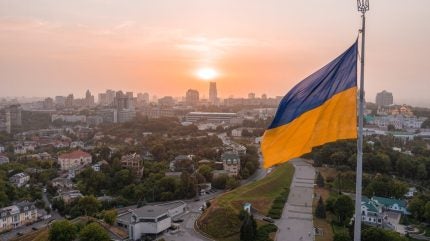
Ukraine has become an associate member of the Three Seas Initiative – a forum of European nations and their partners in energy, transport and digital sectors – following a two-day reunion of the platform’s members in Bucharest, Romania.
The two-day summit began on 6 September and brought together 12 EU member states situated between the Baltic, Black and Adriatic Seas. The meeting hosted high-ranking EU officials as well as representatives from partner countries including Ukraine and Moldova.

Discover B2B Marketing That Performs
Combine business intelligence and editorial excellence to reach engaged professionals across 36 leading media platforms.
By joining the Three Seas Initiative, Ukraine now has access to all the tools – including investment opportunities – developed within the initiative.
“On the first day of the summit, the discussion focused mainly on Ukraine,” said Yuliia Svyrydenko, First Deputy Prime Minister and Minister of the Economy of Ukraine. “For our partners, the war started by Russia has become a reason to think about the need to change global approaches – modernising infrastructure, transport systems, food supply, attracting investment in energy and other strategic sectors to get rid of Russian oil and gas altogether.”
In a joint declaration released by the group, the 12 countries from the Three Seas Initiative promised to play a role in Ukraine’s reconstruction once the war ends.
“We remain committed to providing continued support to Ukraine for as long as it takes,” said joint declaration.

US Tariffs are shifting - will you react or anticipate?
Don’t let policy changes catch you off guard. Stay proactive with real-time data and expert analysis.
By GlobalDataIn addition, the Romanian Government said it would invest €290m ($311.12m) in the Black Sea port of Constanta, part of wider investments that could help Kyiv export more grain to the rest of the world.
Ukrainian grain exports remain a thorny issue for five Eastern EU countries, who have banned their export to protect their farmers against falling prices. Svyrydenko said removing trade barriers is important for Ukraine to resume exports.
Why is the Three Seas Initiative important for Ukraine?
The Three Seas Initiative is a political platform for central and eastern European countries to improve their infrastructure connections on the EU’s north-south axis.
At stake, there is €913m available in an investment fund. The initiative covers projects ranging from energy infrastructure development to stronger road networks between the countries.
For Ukraine, the interest lies in projects targeting gas circulation in the region as well as joining the Via Carpathia, a planned highway network connecting the ports of Klaipeda (Lithuania) and Thessaloniki (Greece).
“In the energy sector, it is about gas flow and storage of gas. In the infrastructure sector, it’s Via Carpathia, but also the Odessa-Gdansk railway, which needs investments,” says Sergii Gerasymchuk, deputy executive director at the foreign policy council Ukrainian Prism think tank.
Traffic from Ukrainian Black Sea ports came to a halt following Russia’s withdrawal from the Black Sea Grain Deal in July 2023.
In the absence of a renewed grain deal enabling Ukraine to ship its grain through its Black Sea routes, Kyiv’s only hope is to attract enough investment and modernise its land-based connections with the EU.
Speaking about gas storage and distribution, Gerasymchuk notes the mutual benefit arising from Ukraine’s membership in the group.
“It is an additional chance for Ukraine to get [access] to the resources,” he says. “Meanwhile, Ukraine can provide gas storage for vulnerable neighbours such as Bulgaria and Moldova but also for private companies interested in storing their gas [with Ukraine].” However, he states that Ukraine cannot be expected to contribute to the fund. Rather, it should be a direct beneficiary of it.
Challenges to investors
Keeping investors safe is difficult in the context of Russian missiles constantly threatening their goods and services. According to the Centre for Economic Policy Research – a think tank based in London – Ukraine needs an international guarantee scheme for war-risks insurance funded by donors, which would restore investor confidence in the country to an extent.
A similar insurance scheme has been in place near Ukraine’s Donetsk and Lugansk regions since before 2022, with the policies being sold by Ukrainian companies and reinsured on international markets.
More recently, the European Commission has come up with a four-year programme called the Ukraine Guarantee to cover loans (including local currency loans), guarantees, counter-guarantees, capital market instruments and any other type of funding or credit enhancement, insurance and equity/quasi-equity participation.
However, for that to happen, private insurance companies will need to get involved, given that the Ukrainian Government would be in no position to sponsor a state-owned insurance company in times of war.
“Private investors are interested in insuring their investments, and insurance in the time of war largely depends on the goodwill of national governments who can provide traditional guarantees to the insurance companies, to assist them in getting insurance for investments that go to the country which is in a state of war,” Gerasymchuk adds.



